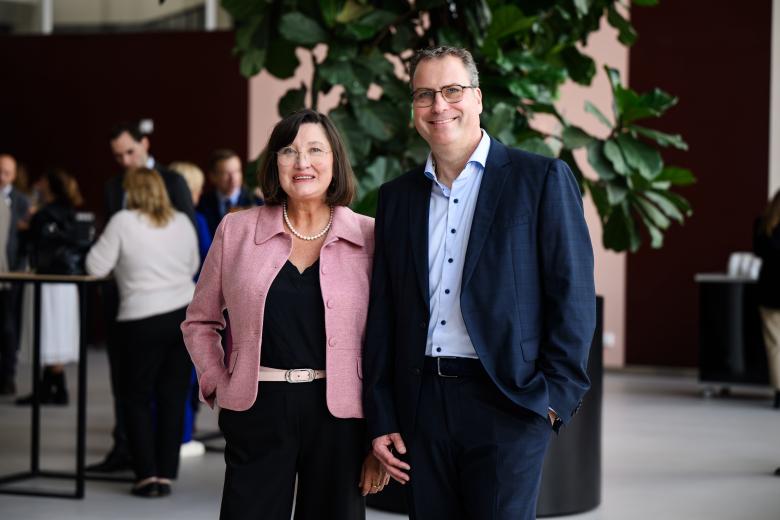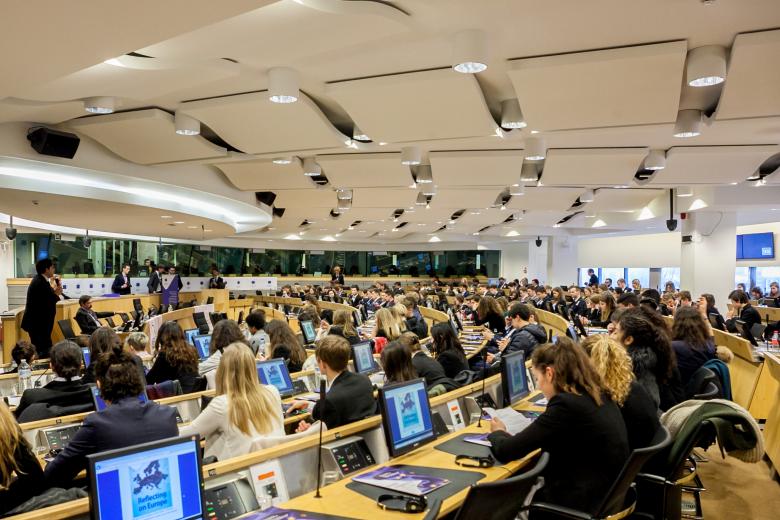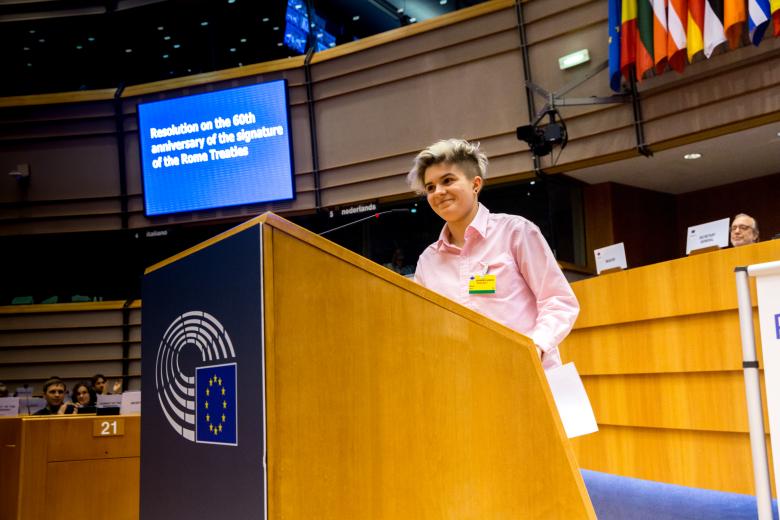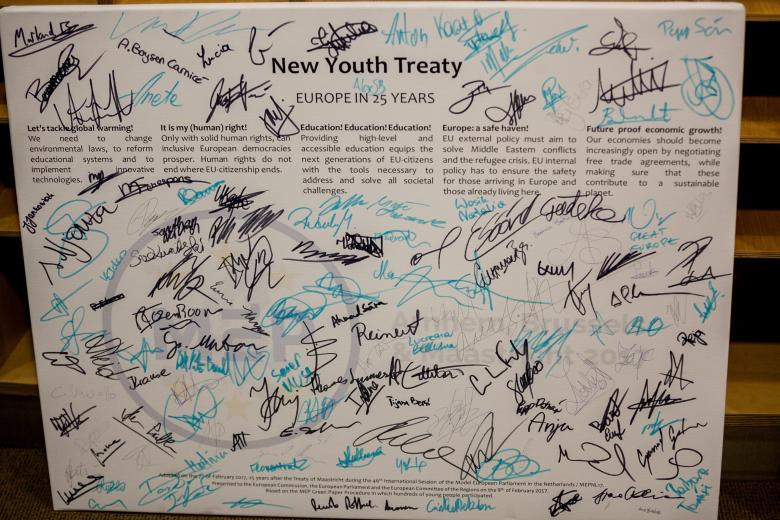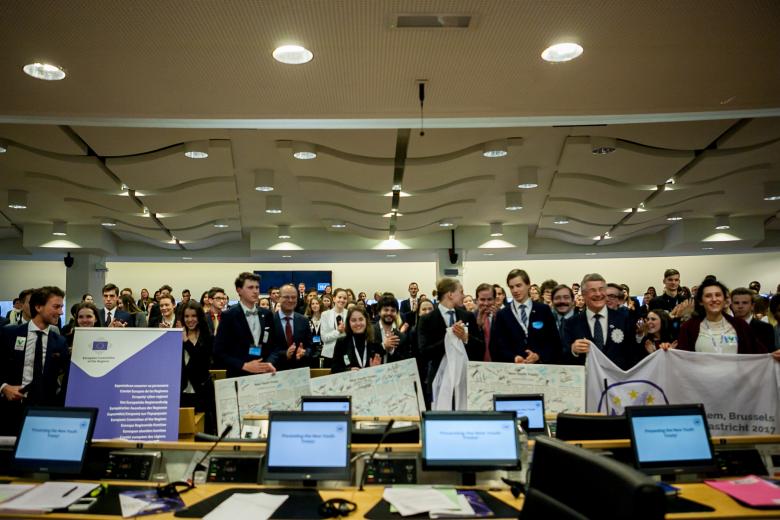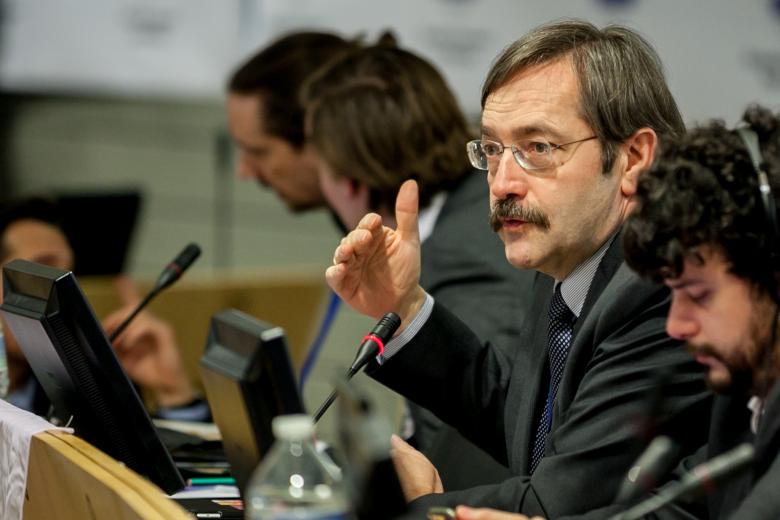Standing in the shoes of member of the European parliament in Maastricht
185 youngsters under the age of eighteen got the opportunity to stand in the shoes of a European parliament member last week. This year, the biannual Model European Parliament took place in Arnhem and Maastricht, the location where the Maastricht Treaty was signed 25 years ago. The goal of the 8-day conference that brought youngsters from 27 countries to Maastricht? Become acquainted with politics and Europe. “But some of them are 'political animals', two out of three say that they would like to become member of the European parliament,” says Raphaël Lepot (24), who helped organise the conference. The participants attended a series of workshops and lectures at Maastricht University.
The Model European Parliament (MEP) allows youngsters to become acquainted with European decision making in a very realistic manner. They work on resolutions during the conference and learn how to lobby and write speeches. The event even has a 'parliamentary press' that reports on the event. Secondary school students from all EU member states and candidate states are invited to participate.
Own amendment
Raphaël Lepot is the chair of the 'MEP for you' foundation, the foundation that was responsible for getting the conference to Maastricht. The organisation presented the bid to bring the 2017 edition of event to Maastricht two years ago. “The event usually takes place in a European capitol, but we wanted to break with tradition to commemorate the 25-year anniversary of the signing of the Maastricht Treaty.” With financial aid from the provinces of Limburg and Gelderland, they were able to realise their plan. The group also stayed in Brussels for one day, where they met Tibor Navracsics, the European Commissioner for Education, Culture, Youth and Sport, and the chair of the Committee of the Regions, Markku Markkula. They also had the opportunity to propose their own amendments to a resolution at the Committee of the Regions, together with governor Theo Bovens. “We were invited to come into the plenary hall from the public gallery to propose the resolution. Everybody was cheering when it was accepted,” says Lepot. (read on below the photo impression)
Top 3 priorities
In the months preceding the conference, the participants were asked to indicate what they thought was important for the future of Europe via an online tool. The top 3 issues were: better education, Europe as a safe and righteous haven for everyone and more attention for the interest of young people in Europe. “We don't need more information packages about how Europe works - that's what they were trying to convey. We want to be heard,” Lepot summarises.
A new 'Maastricht Treaty'
In addition to this top 3, the participants indicated that sustainable economic growth and an inclusive society with jobs for everyone were important points of attention. These priories have been included in a New Youth treaty (referring to the 'Maastricht Treaty'), that was printed on a canvas and signed by all the participants. The treaty was subsequently presented to the president of the Committee of the Regions and three European parliament members.'
Most of the participants had attended local, regional or national versions of the Model European Parliament. “For some, all of this is new. But others are real 'political animals' who are aiming for a career in Brussels. When we asked who could see themselves become a member of the European Parliament during the gathering at the UM School of Business and Economics last Tuesday, two thirds of the room got up. That surprised me,” says Lepot. Lepot, who was born and raised in Maastricht, recently became a lobbyist in Brussels for the Province of Limburg – a career he started at an international MEP conference in Bratislava when he was sixteen years old.
Also read
-
Steel tariffs explained: Why is the EU doubling them — and at what cost?
The EU announced last week that it would double its tariffs on steel to 50 percent, bringing them in line with US levels. Studio Europa Maastricht spoke with Mark Sanders, Associate Professor of International Economics at Maastricht University about the latest developments surrounding the increase...

-
ERASMUS+ - free movement of ideas and skills
Under ERASMUS+, the European Commission's mobility programme for education and training, UM sends and receives more students than any other Dutch university. President Rianne Letschert on her own ERASMUS experience, the benefits of leaving your comfort zone, and being inspired by different...

-
WHO designates two CAPHRI centres as new Collaborating Centres for Public Health Leadership and Workforce Development
With these centres, WHO wants to advance the professionalisation and competencies of the public health workforce.
